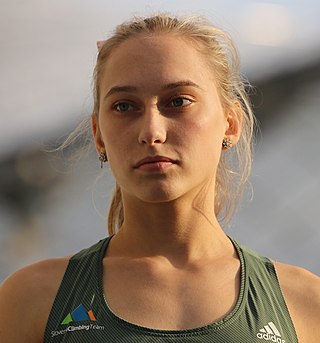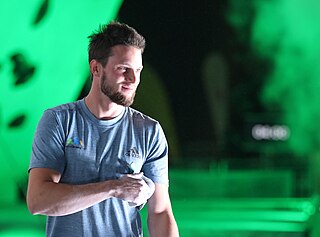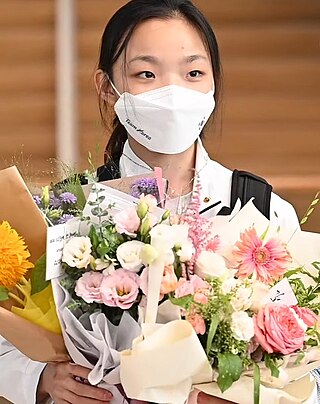
Competition climbing is a form of regulated rock climbing competition held indoors on purpose-built artificial climbing walls. The three competition climbing disciplines are lead climbing, bouldering, and speed climbing. The result of multiple disciplines can be used in a "combined" format to determine an all-round winner. Competition climbing is sometimes called "sport climbing", which is the name given to pre-bolted lead climbing.

Janja Garnbret is a Slovenian professional rock climber who specializes in sport climbing and competition climbing. She has won multiple competition lead climbing and competition bouldering events, two Olympic gold medals, and is widely regarded as the greatest competition climber of all time. In 2021, Garnbret became the first-ever female Olympic gold medalist in climbing, and successfully defended her title in 2024. With two gold medals, she is the most successful Slovenian athlete at the Summer Olympics. She is also the world's first-ever female climber to onsight an 8c (5.14b) graded sport climbing route.

The 2018 season of the IFSC Climbing World Cup was the 20th season of the competition. Bouldering competitions were held at seven stops of the IFSC Climbing World Cup. The bouldering season began on April 13 at the World Cup in Meiringen, and concluded on 18 August with the World Cup in Munich. At each stop a qualifying was held on the first day of the competition, and the semi-final and final rounds are conducted on the second day of the competition. The winners were awarded trophies, and the best three finishers received medals. At the end of the season an overall ranking was determined based upon points, which athletes were awarded for finishing in the top 30 of each individual event. Jernej Kruder won the seasonal title in the men's competition and Miho Nonaka won the women's. Japan won the national team competition.

The 2018 IFSC Climbing World Championships, the 15th edition, were held in Innsbruck, Austria from 6 to 16 September 2018. The championships consisted of lead, speed, bouldering, paraclimbing, and combined events.
Lead climbing competitions at the 2017 IFSC Climbing World Cup were held at eight stops. The winners were awarded trophies, and the best three finishers received medals. At the end of the season an overall ranking was determined based upon points, which athletes were awarded for finishing in the top 30 of each individual event. Romain Desgranges won the men's seasonal title, Janja Garnbret won the women's seasonal title, and Slovenia won the national team title.
The 2017 IFSC Climbing World Cup was held in 15 locations. Bouldering competitions were held in 7 locations, lead in 8 locations, and speed in 7 locations. The season began on 7 April in Meiringen, Switzerland and concluded on 12 November in Kranj, Slovenia.
The 2018 IFSC Climbing World Cup was held in 14 locations. There were 22 events: 7 bouldering, 7 lead, and 8 speed events. The season began on 13 April in Meiringen, Switzerland, and concluded on 28 October in Xiamen, China.
The 2016 IFSC Climbing World Cup was held in 16 locations. Bouldering, lead and speed competitions were held in 7 locations. The season began on 15 April in Meiringen, Switzerland and concluded on 27 November in Kranj, Slovenia.
The 2015 IFSC Climbing World Cup was held in 13 locations. Bouldering competitions were held in 5 locations, lead in 7 locations, and speed in 5 locations. The season began on 17 May in Central Saanich, Canada and concluded on 15 November in Kranj, Slovenia.
The 2019 season of the IFSC Climbing World Cup was the 21st season of the competition. Bouldering competitions were held at six stops of the IFSC Climbing World Cup. The bouldering season began on April 5 at the World Cup in Meiringen, and concluded on June 8 with the World Cup in Vail. At each stop a qualifying was held on the first day of the competition, and the semi-final and final rounds were conducted on the second day of the competition. The winners were awarded trophies, and the best three finishers received medals. At the end of the season an overall ranking was determined based upon points, which athletes were awarded for finishing in the top 30 of each individual event.
The 2019 IFSC Climbing World Cup was held in 12 locations. Bouldering, lead and speed competitions were each held in 6 locations. The season began on 5 April in Meiringen, Switzerland with the first bouldering competition in the season, and concluded on 27 October in Inzai, Japan, with the last lead climbing competition in the season.

Ai Mori is a Japanese professional rock climber who specializes in competition lead climbing and competition bouldering.

Oriane Bertone is a French rock climber, who specializes in competition climbing, but is also noted for her sport climbing and her bouldering.

Seo Chae-hyun, also known as Chaehyun Seo, is a South Korean professional rock climber who specializes in competition climbing. She won the overall 2019 World Cup title in competition lead climbing in her senior debut season. In 2021 she won the IFSC World Championship in lead climbing. Seo is a two-time Olympian, having represented South Korea at the 2020 and 2024 Summer Olympics.
The 2021 IFSC Climbing World Cup was the 33rd edition of the international sport climbing competition series, held in seven locations. There are 11 events: four bouldering, five lead, and two speed events. The season began on 16 April in Meiringen, Switzerland with the first bouldering competition in the season, and concluded on 4 September in Kranj, Slovenia. The International Federation of Sport Climbing had initially scheduled 18 events concluding on 31 October, but COVID-19 travel restrictions resulted in the cancellation of events in Xiamen and Wujiang in China, Jakarta in Indonesia and Seoul in South Korea.
The 2021 season of the IFSC Climbing World Cup was the 22nd season of the competition. Bouldering competitions will be held at six stops of the IFSC Climbing World Cup. The bouldering season began on April 16 at the World Cup in Meiringen, and concluded on 26 June with the World Cup in Innsbruck. The International Federation of Sport Climbing had initially scheduled six bouldering events concluding on 24 October, but COVID-19 travel restrictions resulted in the cancellation of events in Wujiang in China and Seoul in South Korea.
Competition lead climbing at the 2021 IFSC Climbing World Cup was held at five locations, from 23 June to 4 September 2021. The International Federation of Sport Climbing had initially scheduled six competition-lead climbing events concluding on 17 October, but COVID-19 travel restrictions resulted in the cancellation of the event in Xiamen, China.
Speed climbing competitions at the 2021 IFSC Climbing World Cup are being held at two locations, from 28 May to 3 July 2021. The International Federation of Sport Climbing had originally scheduled six speed climbing events concluding on 31 October, but COVID-19 travel restrictions resulted in the cancellation of events in Xiamen and Wujiang in China, Jakarta in Indonesia and Seoul in South Korea.

Yoshiyuki Ogata is a Japanese professional competition climber and boulderer. He has won multiple medals in competition bouldering at IFSC Climbing World Cup events, including gold medals at Vail in 2019 and at Innsbruck in 2021. Ogata won the overall IFSC Men's Bouldering title for the 2021 and 2022 seasons and finished third overall in 2019.
Erin McNeice is an English rock climber who specialises in competition climbing. She represented Great Britain at the 2024 Summer Olympics, finishing fifth in the combined Boulder and Lead competition.







